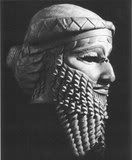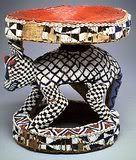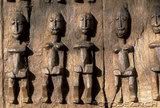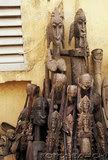Saturday, June 2, 2007
Ancient African and African Empires Timeline
http://findarticles.com/p/articles/mi_qa3812/
is_200001/
ai_n8878495
Ancient Africa & African empires timeline
New Crisis, The, Jan/Feb 2000 by Agatucci, Cora
Great ancient African civilizations, in their day, were just as splendid and glorious as any on the face of the earth.
5-2.5 million B.C.E.
Fossils, rocks, ancient skeletal remains have been uncovered in the Rift Valley and surrounding areas. Evidence points to a common human ancestry originating in Africa from the emergence of a humanlike species in eastern Africa some 5 million years ago. From Hadar, Ethiopia, the 3.18 million year-old remains of "Lucy" were unearthed in 1974.
Related Results
African art treasure returned...
U.S. exhibit on ancient North...
Make an African rainstick -...
The African collection at the...
600,000 - 200,000
Wide spread of species across Asia, Europe, and Africa. Fire use develops. The earliest true human beings in Africa, Homo sapiens, date from more than 200,000 years ago. Hunter-gatherers capable of making crude stone tools, Homo Sapiens banded together with others to form nomadic groups; eventually these nomadic peoples spread throughout the African continent. Discoveries suggest Africa was the primary genecenter for cultivated plants like cotton, sorghum, watermelon, kola-nuts and coffee, and was the first site of the domestication of certain plants for food.
25,000-10,000
Rock art of North and South Africa
6000 - 4000
The River People emerge along Nile, Niger, and Congo Rivers (West-Central Africa); the Isonghee of Zaire (Democratic Republic of Congo) introduce the mathematical abacus; and Cyclopian stone tombs built in Central African Republic area. Spread of agriculture south of the Sahara Desert supports a growing population, which mastered animal domestication and agriculture, and forced older nomadic groups (such as the San) into less hospitable areas.
ca. 4500
Ancient Egyptians begin using burial texts to accompany their dead, first known written documents. Ancient Egyptians, who called their land Kemet[or Kmt] (Land of the Blacks) and Ta-Meri (Beloved Land), were primarily agriculturists who, with the practice of irrigation and animal husbandry, transformed the Nile Valley into a vibrant food-producing economy by 5000 B.C.E. Their settled lifestyle allowed them to develop skills in glass making, pottery, metallurgy, weaving, woodworking, leather work, and masonry. In this latter craft, ancient Egyptian practitioners excelled in architecture, as the pyramids attest.
4000 - 1000
Ancient African civilizations of the Nile Valley are established and flourish. Ancient Egyptians traced their origins to the Mount Rwenzori range in East Africa known as the "Mountains of the Moon," and in some accounts to "Ethiopia," a term variously designating land south of Egypt (the Upper Nile Valley), or the entire African continent. Thus Nubia, Egypt's southern neighbor with its own civilization, probably preceded Egyptian (Kemet) civilization.
By 2500
Centers of early civilization flourish in Mesopotamia, Egypt, northeastern India, and northern China.
The African-Egyptian Question: Most of us in the West are familiar with ancient Egyptian civilization and its achievements (e.g., the pyramids) as one of the cradles of [Western] civilization. Yet it is important to remember that Egypt is in Africa and that ancient Kemet (as the ancient Egyptians called their kingdom, a term dating from ca. 3100 B.C.E.) is also the cradle of Black African civilization.
A subject of heated contemporary debate is the ethnicity and/or color of the ancient Egyptians, and Africanist scholars like Molefi Kete Asante and Abu S. Abarry observe that the more [ancient] Egypt is seen as a society of significance to human civilization, the more its [black African] origins are disputed by some white scholars." They claim that racist sentiments have led "revisionist historians of the fifteenth to the twentieth centuries, the age of the European slave trade [and European colonization of Africa], to discredit Africans, to explain away the African base" of ancient Egypt, "and to accredit all African achievement to the presence of European genes." It is well to note that the ancient Greeks described the way the Egyptians looked to them: "The ancient Greek writers Herodotus, Diodorus Siculus, and Aristotle all testified that the ancient Egyptians were 'blackskinned (Asante and Abarry 3-4).
The African-Egyptian Question II: Asante and Abarry are among Africanist scholars who maintain that African "civilization as expressed from the ancient cultures of the Nile Valley [e.g. Egypt/Kemet, Nubia/Kush), have tied together the diverse peoples of the continent and the Diaspora [*definition below] in ways that distinguish Africans from Europeans or Asians"-although one must be careful not "to assume too much commonality" among African cultures and societies, each "unique, having developed its own orientation to the universe and the physical environment in its concepts of religion, science, art, and politics."
Nevertheless, in "the practical experiences of African peoples" across the continent today these scholars trace the continuation of "ancient myths and beliefs in resurrection and life, reincarnation, matrilineality [lineage traced through the "mothers"], burial of the dead, the value of children, the ultimate goodness of the earth" (Asante and Abarry 111 ), as well as reverence for the ancestors believed part of the living human community-a worldview integrating past and future into the present.
is_200001/
ai_n8878495
Ancient Africa & African empires timeline
New Crisis, The, Jan/Feb 2000 by Agatucci, Cora
Great ancient African civilizations, in their day, were just as splendid and glorious as any on the face of the earth.
5-2.5 million B.C.E.
Fossils, rocks, ancient skeletal remains have been uncovered in the Rift Valley and surrounding areas. Evidence points to a common human ancestry originating in Africa from the emergence of a humanlike species in eastern Africa some 5 million years ago. From Hadar, Ethiopia, the 3.18 million year-old remains of "Lucy" were unearthed in 1974.
Related Results
African art treasure returned...
U.S. exhibit on ancient North...
Make an African rainstick -...
The African collection at the...
600,000 - 200,000
Wide spread of species across Asia, Europe, and Africa. Fire use develops. The earliest true human beings in Africa, Homo sapiens, date from more than 200,000 years ago. Hunter-gatherers capable of making crude stone tools, Homo Sapiens banded together with others to form nomadic groups; eventually these nomadic peoples spread throughout the African continent. Discoveries suggest Africa was the primary genecenter for cultivated plants like cotton, sorghum, watermelon, kola-nuts and coffee, and was the first site of the domestication of certain plants for food.
25,000-10,000
Rock art of North and South Africa
6000 - 4000
The River People emerge along Nile, Niger, and Congo Rivers (West-Central Africa); the Isonghee of Zaire (Democratic Republic of Congo) introduce the mathematical abacus; and Cyclopian stone tombs built in Central African Republic area. Spread of agriculture south of the Sahara Desert supports a growing population, which mastered animal domestication and agriculture, and forced older nomadic groups (such as the San) into less hospitable areas.
ca. 4500
Ancient Egyptians begin using burial texts to accompany their dead, first known written documents. Ancient Egyptians, who called their land Kemet[or Kmt] (Land of the Blacks) and Ta-Meri (Beloved Land), were primarily agriculturists who, with the practice of irrigation and animal husbandry, transformed the Nile Valley into a vibrant food-producing economy by 5000 B.C.E. Their settled lifestyle allowed them to develop skills in glass making, pottery, metallurgy, weaving, woodworking, leather work, and masonry. In this latter craft, ancient Egyptian practitioners excelled in architecture, as the pyramids attest.
4000 - 1000
Ancient African civilizations of the Nile Valley are established and flourish. Ancient Egyptians traced their origins to the Mount Rwenzori range in East Africa known as the "Mountains of the Moon," and in some accounts to "Ethiopia," a term variously designating land south of Egypt (the Upper Nile Valley), or the entire African continent. Thus Nubia, Egypt's southern neighbor with its own civilization, probably preceded Egyptian (Kemet) civilization.
By 2500
Centers of early civilization flourish in Mesopotamia, Egypt, northeastern India, and northern China.
The African-Egyptian Question: Most of us in the West are familiar with ancient Egyptian civilization and its achievements (e.g., the pyramids) as one of the cradles of [Western] civilization. Yet it is important to remember that Egypt is in Africa and that ancient Kemet (as the ancient Egyptians called their kingdom, a term dating from ca. 3100 B.C.E.) is also the cradle of Black African civilization.
A subject of heated contemporary debate is the ethnicity and/or color of the ancient Egyptians, and Africanist scholars like Molefi Kete Asante and Abu S. Abarry observe that the more [ancient] Egypt is seen as a society of significance to human civilization, the more its [black African] origins are disputed by some white scholars." They claim that racist sentiments have led "revisionist historians of the fifteenth to the twentieth centuries, the age of the European slave trade [and European colonization of Africa], to discredit Africans, to explain away the African base" of ancient Egypt, "and to accredit all African achievement to the presence of European genes." It is well to note that the ancient Greeks described the way the Egyptians looked to them: "The ancient Greek writers Herodotus, Diodorus Siculus, and Aristotle all testified that the ancient Egyptians were 'blackskinned (Asante and Abarry 3-4).
The African-Egyptian Question II: Asante and Abarry are among Africanist scholars who maintain that African "civilization as expressed from the ancient cultures of the Nile Valley [e.g. Egypt/Kemet, Nubia/Kush), have tied together the diverse peoples of the continent and the Diaspora [*definition below] in ways that distinguish Africans from Europeans or Asians"-although one must be careful not "to assume too much commonality" among African cultures and societies, each "unique, having developed its own orientation to the universe and the physical environment in its concepts of religion, science, art, and politics."
Nevertheless, in "the practical experiences of African peoples" across the continent today these scholars trace the continuation of "ancient myths and beliefs in resurrection and life, reincarnation, matrilineality [lineage traced through the "mothers"], burial of the dead, the value of children, the ultimate goodness of the earth" (Asante and Abarry 111 ), as well as reverence for the ancestors believed part of the living human community-a worldview integrating past and future into the present.
Labels: African Timeline
Subscribe to Comments [Atom]







